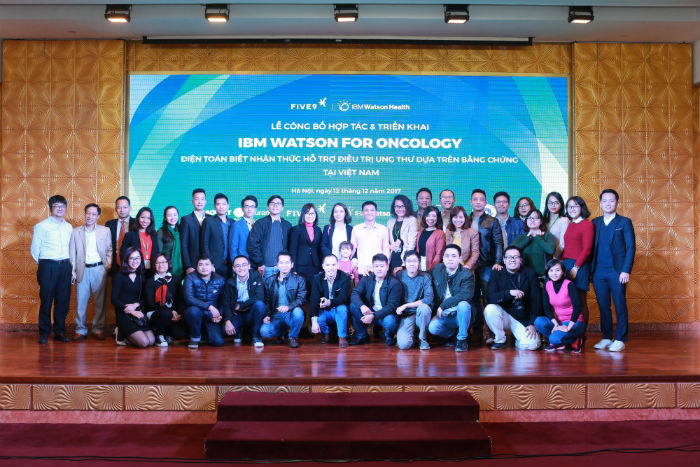Hybrid Cloud
Embracing Hybrid Cloud, AI for the Modern App Revolution
April 23, 2018 | Written by: Nguyen Trong Huan
Categorized: Hybrid Cloud | IBM Cloud | IBM Cloud Private
Share this post:
 When I founded Five9 Vietnam Corp., in 2010 we had, what seemed to be a simple mission: to serve businesses across the country with superior, affordable IT services. We provided software development and offered cloud services. The more we worked with clients, the more we realized that what they really wanted was help with their digital transformations.
When I founded Five9 Vietnam Corp., in 2010 we had, what seemed to be a simple mission: to serve businesses across the country with superior, affordable IT services. We provided software development and offered cloud services. The more we worked with clients, the more we realized that what they really wanted was help with their digital transformations.
They wanted help mobilizing apps, moving workloads to the cloud, and more. We embraced that challenge, expanded our expertise and grew quickly. We now employ more than 550 people, who focus on four distinct industries: banking, finance, insurance, and healthcare.
As with much of the business world, a lot has changed in Vietnam over the last ten years. One industry in particular, the financial sector, has changed a great deal. In recent years, the industry has struggled for a variety of reasons, including the market dynamics around bad debt. But that’s all changing, and in large part thanks to the tech sector. Advances in areas like Internet banking, mobile banking, and automatic payment services – all of which are possible through cloud services – have lifted our once sagging financial sector. In fact, recent successes led some analysts to describe 2017 as a year of “spectacular recovery” for the sector.
We’ve known the value of cloud and its potential positive impact on business at Five9 since our beginning and we continue to aggressively push all our clients, across industries, from financial to healthcare, to do more. It’s one of the main reasons we turned to IBM and the IBM Cloud last year. With that announcement, we launched the company into the world of analytics and AI, all via the IBM Cloud. We were able to start tapping into Watson APIs on IBM Bluemix to create cloud native apps for our clients to use to stay competitive and personalize services for their customers.
We started building apps on premises and providing them to clients on IBM Cloud via VMware. Today, we’re taking this relationship to a new level and adopting IBM Cloud Private. With this secure, Kubernetes-based platform we’re able to design and develop apps faster and more easily than ever. And by packaging the apps as containers, it’s easy to deploy them on the public cloud where they can tap IBM’s microservices such as analytics, AI and blockchain to further extend their functionality.
Today our apps are infused with cognitive capabilities that can analyze unstructured data collected from sources like social media and IoT helping our clients better understand their customers and make better, more informed decisions.
The result of all of this is a true hybrid cloud environment that has rigorous security, elasticity and performance – all the things that enterprises in Vietnam are looking for to fulfill their digital transformations.
With our own private cloud, Five9 now has complete control over its dedicated data center. We are in charge of monitoring and maintaining the data, as well as controlling the performance. The platform’s multilevel security, across hardware, network, and data storage, gives us peace of mind, and because the cloud is behind the same firewall on Five9’s intranet, we have much faster data-transfer rates.
And in keeping with our original cloud AI work with IBM, we’re excited to take advantage of IBM Cloud Private for Data, the company’s new data science, engineering and app building platform. Through this solution, we’ll be able to analyze massive amounts of data quickly, and build machine learning into applications that help our clients learn as they’re used.
The ability to integrate all that the private and public cloud has to offer with analytics, application development and modernization – and all with the speed and flexibility that containers offer – will help Five9 leapfrog even further into the new era of cognitive.

Chairman and CEO, Five9 Vietnam Corporation
How a Hybrid Multicloud Strategy Can Overcome the Cloud Paradox
Public clouds have a lot to offer. Public clouds bring about agility, elasticity, and speed, which make a company’s IT shop become a lot more responsive to the needs of its business. By shifting workloads to the cloud, businesses can make great strides in reducing costs and boosting productivity. This allows them to focus on […]
Q&A with Hillery Hunter, VP & CTO IBM Cloud on IBM’s Software Transformation
A couple of weeks after having closed its landmark acquisition of Red Hat, IBM is announcing new cloud capabilities that will transform the way clients do business and accelerate their journey to the cloud. This includes: IBM Cloud Paks, Red Hat OpenShift on IBM Cloud, Red Hat OpenShift on IBM Z and LinuxOne, and Consulting […]
Q&A: IBM’s Landmark Acquisition of Red Hat
Arvind Krishna, Senior Vice President, IBM Cloud & Cognitive Software and Paul Cormier, Red Hat Executive Vice President and President, Products and Technologies discuss the landmark acquisition. How will IBM and Red Hat benefit from joining forces? Paul: Red Hat is an enterprise software company with an open source development model. A fundamental tenet […]


